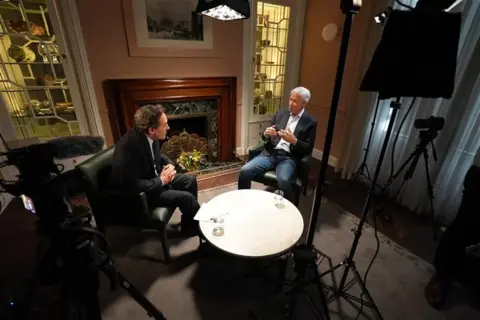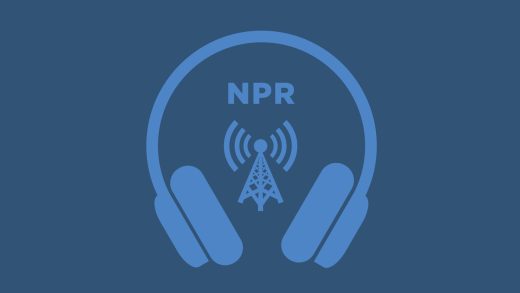Simon JackBusiness editor, and
Michael Sheils McNamee
There is a higher risk of a serious fall in US stocks than is currently being reflected in the market, the head of JP Morgan has told the BBC.
Jamie Dimon, who leads America’s largest bank, said he was “far more worried than others” about a serious market correction, which he said could come in the next six months to two years.
In a rare and wide-ranging interview, the bank boss also said that the US had become a “less reliable” partner on the world stage.
He cautioned he was still “a little worried” about inflation in the US, but insisted he thought the Federal Reserve would remain independent, despite repeated attacks by the Trump administration on its chair Jerome Powell.
Jamie Dimon was in Bournemouth, where he was announcing an investment of about £350m in JP Morgan’s campus there, as well as a £3.5m philanthropic investment in local non-profits.
Chancellor Rachel Reeves the investment was “fantastic news for the local economy and people who live” in Dorset.
Ahead of the interview, Dimon appeared before a town hall on the campus – cutting a figure more akin to an off-duty rock star than bank CEO – wearing an open-collar shirt and jeans, and high-fiving staff on his way to the stage.
Opening with his take on the UK’s economy, Dimon said he felt Rachel Reeves was doing a “terrific job”, and he felt optimistic about some of the government’s attempts to boost innovation and cut regulation.
However, in the broader economic picture, he felt there were increased risks US stock markets were overheated.
“I am far more worried about that than others,” he said.
There were a “lot of things out there” creating an atmosphere of uncertainty, he added, pointing to risk factors like the geopolitical environment, fiscal spending and the remilitarisation of the world.
“All these things cause a lot of issues that we don’t know how to answer,” he said.
“So I say the level of uncertainty should be higher in most people’s minds than what I would call normal.”
Much of the rapid growth in the stock market in recent years has been driven by investment in AI.
On Wednesday, the Bank of England drew a comparison with the dot com boom (and subsequent bust) of the late 1990s – and warned that the value of AI tech companies “appear stretched” with a rising risk of a “sharp correction”.
“The way I look at it is AI is real, AI in total will pay off,” he said.
“Just like cars in total paid off, and TVs in total paid off, but most people involved in them didn’t do well.”
He added some of the money being invested in AI would “probably be lost”.
Bullets, guns and bombs

Global security has been a recent focus for the JP Morgan boss, with his letter to shareholders earlier this year warning the US would run out of missiles in seven days of a South China Sea war.
Reflecting on how the world could combat risk factors, he pointed to greater military investment.
“People talk about stockpiling things like crypto, I always say we should be stockpiling bullets, guns and bombs.
“The world’s a much more dangerous place, and I’d rather have safety than not.”
Another risk factor which many in the global economy believe the US could be facing is pressure placed on the independence of the Federal Reserve, America’s central bank.
On this, he said he thought central bank independence was important – but was willing to take Trump “at his word” that he would not interfere in Fed independence, despite the president describing current Fed chair Jerome Powell as a “moron” and a “numbskull” for failing to lower interest rates more quickly.
Dimon acknowledged the US had become a “little less reliable” but said that some of the Trump administration’s action had pushed Europe to act over underinvestment in Nato and its lack of economic competitiveness.
Dimon also shared insights into a potential breakthrough in trade negotiations between India and the US.
He said he wanted to “bring India closer” and he believed a deal was close to reduce additional tariffs on India, which were imposed as a penalty for its continued trade with Russia, particularly its oil purchases.
“In fact, I’ve spoken to several of the Trump officials who say they want to do that, and I’ve been told that they are going to do that.”
Jamie Dimon’s name has been frequently mentioned among the big financial players capable of making a transition into politics.
Ahead of Trump’s re-election last year, influential investor Bill Ackman said he would be an “incredible choice” as treasury secretary, and he has also been the subject of speculation about a potential presidential run.
Asked about his political ambitions, Dimon said it “wasn’t on the cards”, and his focus was on keeping JP Morgan as a “healthy and vibrant company”.
“If you gave me the presidency, I’d take it,” he joked. “I think I’d do a good job.”


